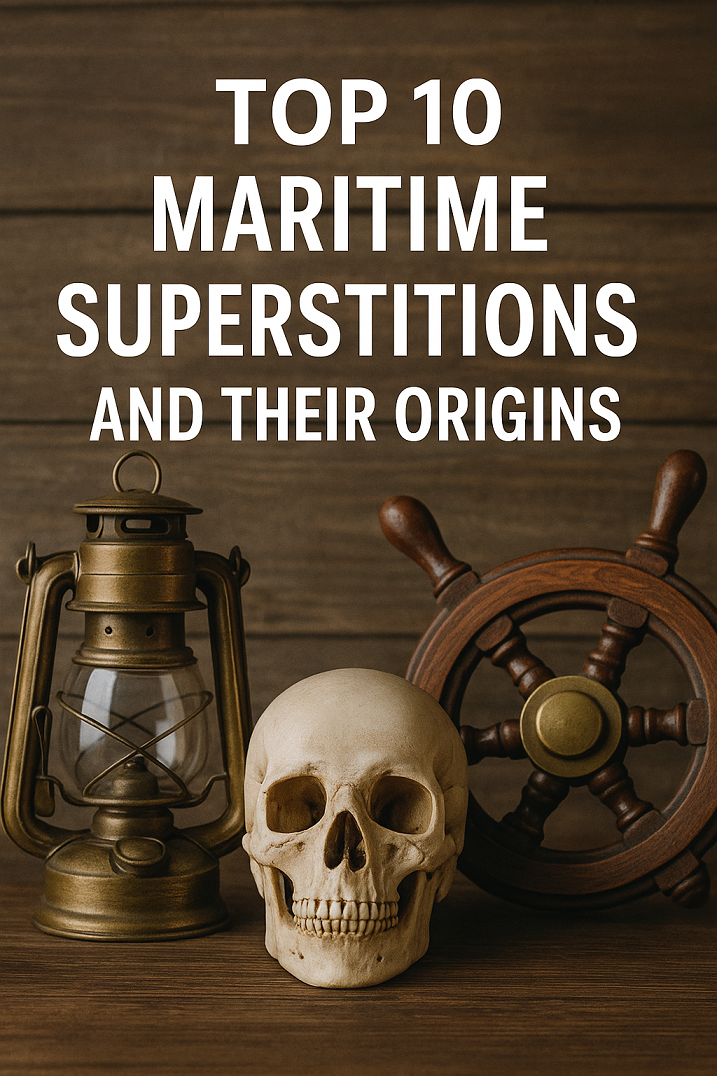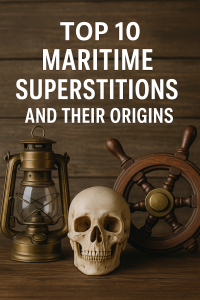Explore the top 10 maritime superstitions and their intriguing origins. From whistling on deck to women aboard ships, uncover the stories that shaped seafaring culture.
Why Maritime Superstitions Matter in Modern Seafaring
Despite the rise of advanced navigation systems, SOLAS-compliant safety practices, and satellite communication, maritime superstitions persist. Seafarers, whether aboard merchant vessels or naval ships, often cling to age-old beliefs rooted in centuries of nautical tradition. These customs aren’t mere relics of the past—they reflect deep psychological coping mechanisms in an unpredictable and hazardous profession.
Superstitions can influence decision-making, onboard behavior, and crew morale. Understanding their origins not only helps preserve maritime heritage but also offers insight into how historical practices continue to shape modern shipping culture.
The Origins of Maritime Superstition
Seafaring, by nature, is fraught with uncertainty. Before radar, weather forecasts, and GPS, mariners relied on instinct, celestial navigation, and faith. Ancient sailors believed the sea was governed by gods and spirits—an unforgiving realm requiring respect and ritual. Superstitions provided explanations for the unexplainable and offered a sense of control over fate. Many beliefs stem from a mix of folklore, religious influence, psychological reinforcement, and observational experience. These traditions were passed down through oral histories, often gaining weight with each retelling.
Top 10 Maritime Superstitions
1. Whistling on Board Invites the Wind
Origin: Whistling was believed to challenge the wind gods, especially Aeolus in Greek mythology. Sailors feared it would stir up storms or cause erratic winds.
Modern Take: Even today, some deckhands avoid whistling, especially during calm weather. Interestingly, the British Royal Navy reportedly discouraged whistling unless it came from the Boatswain’s Pipe.
Related Source: The Nautical Institute – Cultural Influences in Maritime Practice
2. Bananas on Ships Bring Bad Luck
Origin: In the 1700s, fast-moving banana boats often suffered unexplained mishaps. Some say banana cargoes led to faster spoilage of other fruits or harbored poisonous spiders.
Modern Take: Sportfishing crews, particularly in the U.S., still ban bananas aboard. Some charter companies even forbid banana-scented sunscreen!
Scientific Insight: Bananas emit ethylene gas, which accelerates ripening—potentially explaining the link to spoilage.
3. Women on Board Are Bad Luck
Origin: In patriarchal maritime traditions, women were thought to distract male sailors, angering the sea gods. Ironically, figureheads of women were carved on bows to “calm the sea.”
Modern Take: Thankfully, this superstition has been replaced by efforts to empower women in maritime. Today, the IMO and IACS support gender equality with campaigns like IMO’s Women in Maritime programme.
External Link: IMO – Empowering Women in Maritime
4. Changing a Ship’s Name Brings Misfortune
Origin: The name of a ship was considered sacred. Changing it without appeasing the gods was thought to invoke disaster. Poseidon, guardian of the seas, had to be informed through ritual.
Modern Practice: Renaming ceremonies still occur, often involving champagne and ceremonial speech—part tradition, part public relations.
5. A Black Cat Brings Protection
Origin: Black cats, often feared on land, were welcomed on ships. British sailors believed they brought good luck and protected against storms.
Fun Fact: Cats also served a practical role, controlling rodent populations on long voyages.
Real Example: “Unsinkable Sam,” a black cat, reportedly survived three shipwrecks during WWII.
6. Don’t Sail on Fridays—Especially Friday the 13th
Origin: Christian sailors considered Friday, the day of Christ’s crucifixion, to be cursed. The superstition intensified with the association of Friday the 13th as unlucky.
Famous Myth: HMS Friday was allegedly launched on a Friday, captained by a man named Friday—and disappeared. While the story is likely apocryphal, the fear remains.
7. Coins Under the Mast Bring Prosperity
Origin: Ancient Greek and Roman sailors placed coins under masts as offerings to sea gods and to ensure wealth in the afterlife.
Modern Use: The tradition persists as a token gesture. Many shipyards include ceremonial coin placement during keel laying or mast stepping.
Related Practice: Similar rituals are found in the navy, with coins representing naval lineage.
8. Red Sky at Night, Sailor’s Delight
Origin: This weather proverb dates to biblical times and was embraced by mariners who observed it as a reliable forecasting tool.
Scientific Basis: It’s grounded in atmospheric science. A red sky at night usually means high pressure and stable air coming from the west—good weather ahead.
Supporting Data: Refer to NOAA’s Marine Weather Predictions for scientific backing.
9. The Albatross as a Harbinger
Origin: Killing an albatross was taboo. This superstition was immortalized in Samuel Taylor Coleridge’s The Rime of the Ancient Mariner, where the bird symbolizes divine favor.
Modern Relevance: Albatross sightings still stir awe among sailors, who often view them as good omens on long ocean passages.
10. The Number 13 Is Cursed
Origin: Tied to biblical and Norse myths (e.g., Loki as the 13th guest), 13 became synonymous with bad luck. Some ships avoid having a 13th deck or cabin.
Current Use: While less common in modern design, many older vessels avoided the number. Even today, superstitious mariners may hesitate to sail on the 13th.
–
Real-World Applications of Maritime Superstitions
Naval and Merchant Traditions
Navies like the Royal Navy and U.S. Navy embrace ceremonial traditions, blending superstition with formal protocol. Coin ceremonies, christenings, and first crossings (like crossing the equator) reflect how maritime superstition still shapes culture.
Psychological Impact on Seafarers
A study in the Journal of Maritime Psychology (2022) found that seafarers with cultural ties to maritime superstitions reported slightly lower anxiety levels during high-stress voyages. Rituals, even irrational ones, provide comfort in uncertainty.
FAQ – Maritime Superstitions
Q1: Are maritime superstitions still followed today?
Yes, many crews maintain rituals—like coin ceremonies or avoiding whistling—especially during long voyages or challenging weather.
Q2: Do maritime academies teach about superstitions?
While not part of the core curriculum, superstitions are often discussed in naval history or maritime culture classes.
Q3: What’s the most widely held maritime superstition?
“Don’t whistle on deck” remains one of the most widespread, especially among older seafarers.
Q4: Are there cultural variations in maritime superstitions?
Absolutely. For instance, Filipino seafarers might carry religious icons, while Norwegians observe Viking-rooted rituals.
Q5: Can superstition affect safety?
Yes and no. While some superstitions are harmless, others (like delaying departure for astrology) could interfere with schedules or cause stress.
Q6: Has any maritime superstition been scientifically validated?
“Red sky at night” has meteorological support. Other beliefs, like bananas causing mishaps, may be coincidental or rooted in partial truths.
Q7: Are modern shipping companies aware of these traditions?
Yes. Many respect them as part of crew culture, especially in multicultural crews where beliefs vary widely.
Conclusion: Navigating Between Myth and Maritime Science
Maritime superstitions are more than quirky beliefs—they’re cultural artifacts that reveal how humans cope with the ocean’s vast unpredictability. From ancient coin rituals to the cautious avoidance of bananas, each superstition tells a story of seafarers striving for control in an uncontrollable environment.
While modern shipping relies on satellite navigation, compliance with IMO conventions, and stringent SOLAS regulations, these age-old beliefs still find space in the heart of maritime tradition. Understanding them enriches our appreciation of seafaring heritage—and reminds us that not everything onboard a ship is explained by the manual.
References
-
Coleridge, S. T. (1798). The Rime of the Ancient Mariner.
-
U.S. Navy Archives – Naval Traditions and Superstitions.
-
Journal of Maritime Psychology. (2022). “Cultural Rituals and Mental Health Among Seafarers.”


